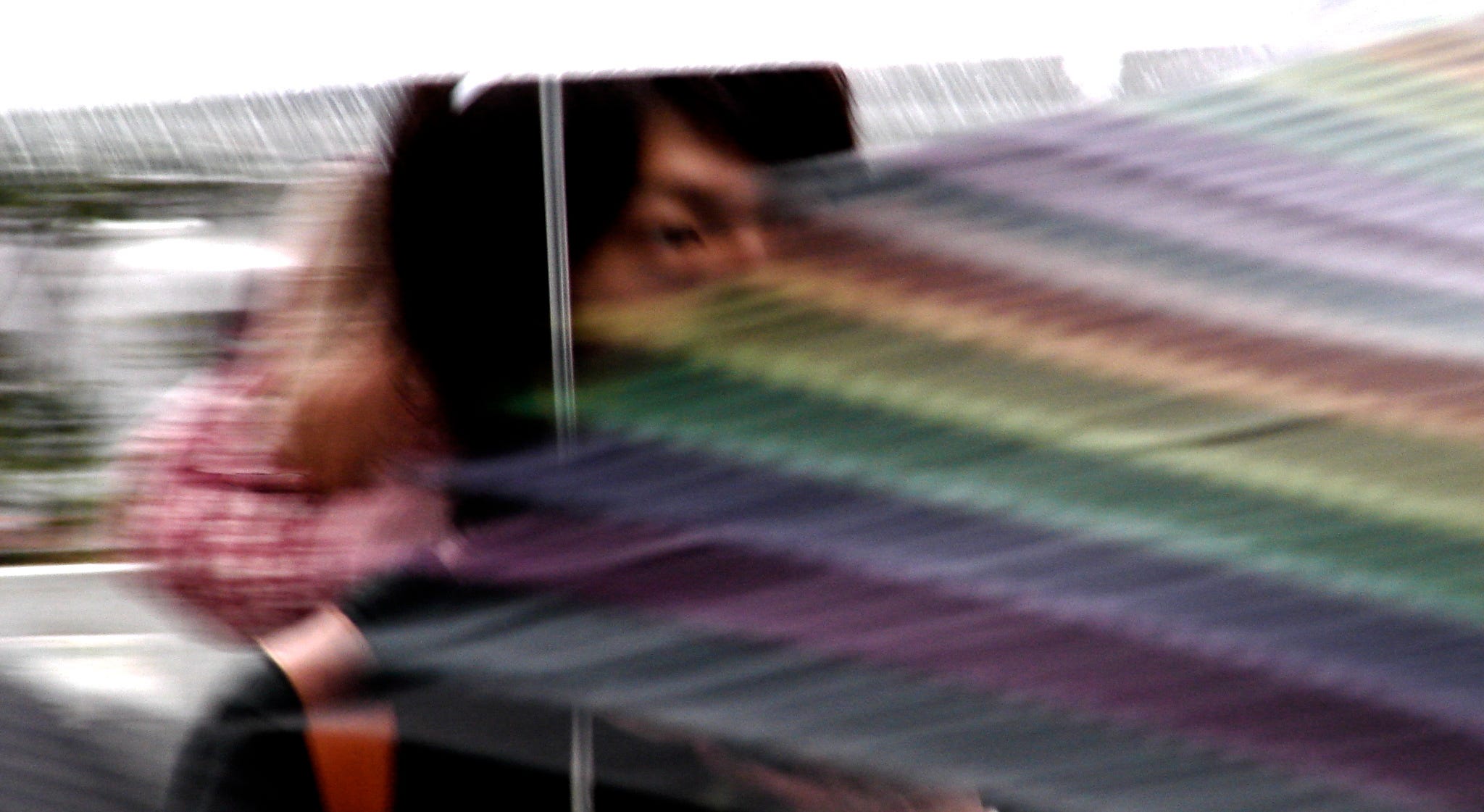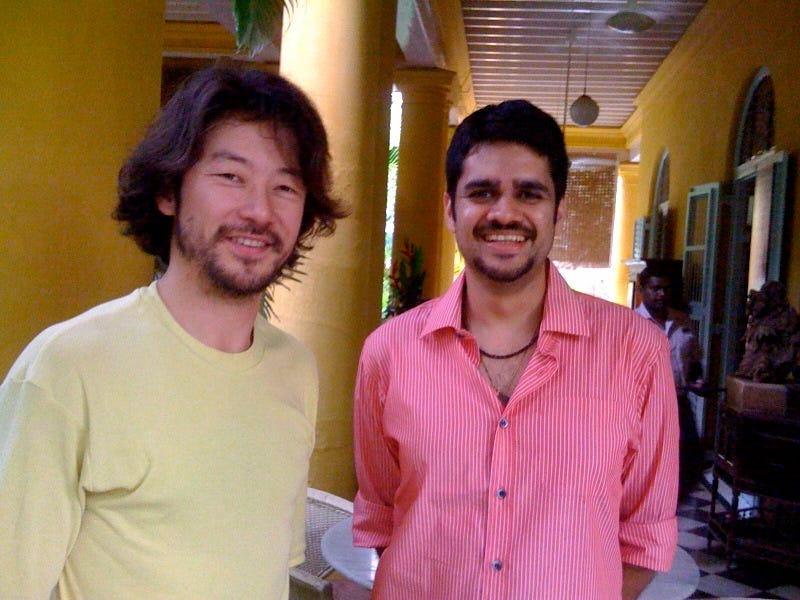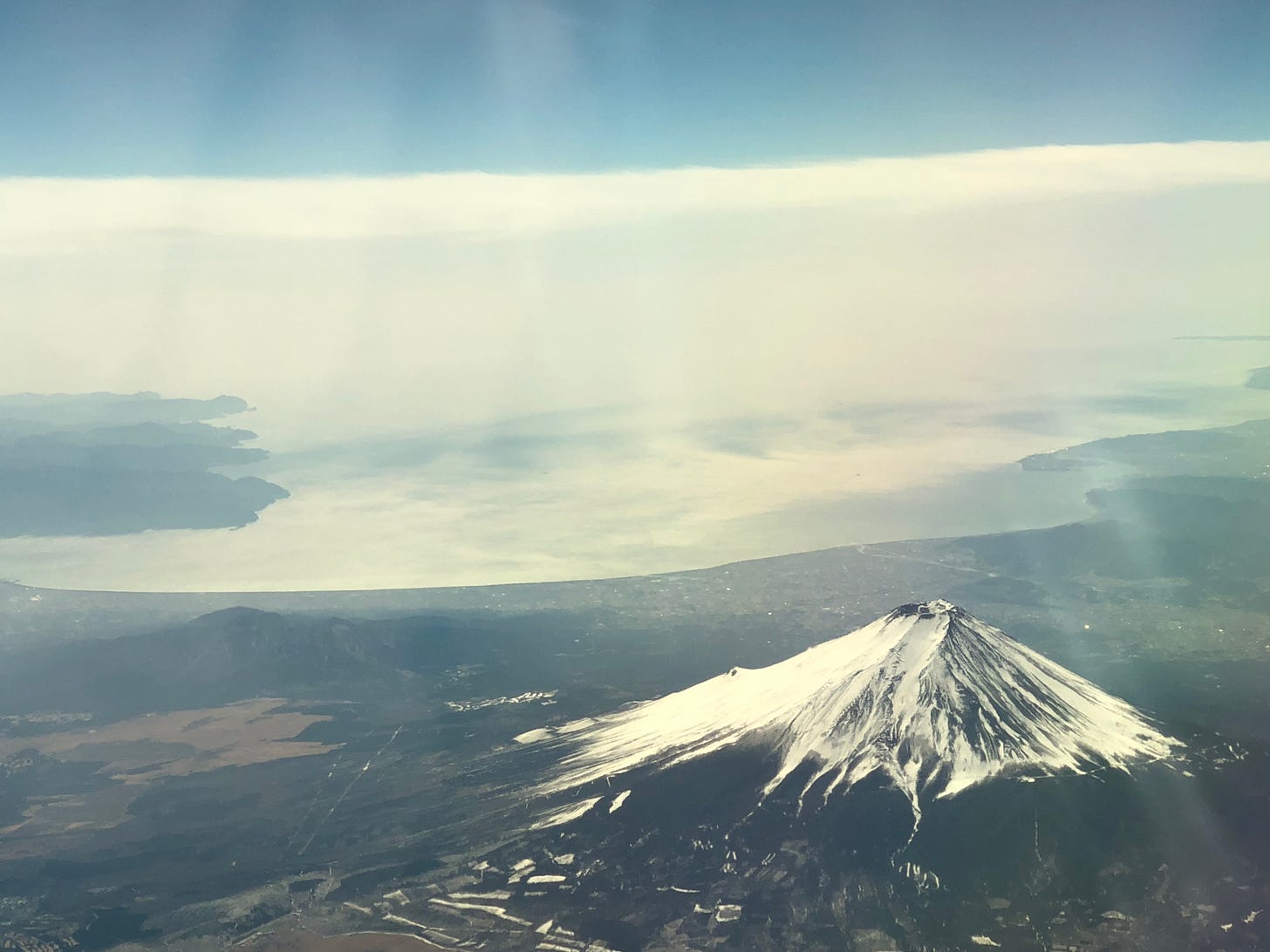Yet Untitled 017 - Japan
That Other Place In My Head
Dear Yet Untitlers,
Obsessions. One of mine has a name, and it’s Japan.
In my 20s, I resisted this obsession. I had many chances to get to know Japan better, even the chance to choose an elective paper on ‘Modern Japan’ for my MA, but I cowered, thinking that it wouldn’t be useful.
Bah! Little did I know!
Remember the Terry Gilliam film Brazil, where Johnathan Pryce’s character tries to break out of dystopian reality; where ‘Brazil’ represents the dream that he wants to escape to? I’d say that Japan started as something of a Brazil for me on similar lines…but as the engagement continued, I found it to be so fascinating, so enriching - I knew it was going to be a long-term relationship.
Of course, any long term relationship goes through its stages:
Stage 1 - being Flummoxed
Before I knew much about Japan, I regarded it with…wide eyed amazement?
“What kind of place has popular entertainment looks like this???” 👉
Simultaneously, in a parallel timeline, a Japanese private citizen was watched the following Bollywood music video, thinking exactly the same thing 👉
Stage 2 - Being Seduced
Because of ‘Lost in Translation’, everyone (read: “me”) wanted to go to Tokyo, get lost and find their Scarlett Johansson while finding themselves. To the 24-year old me who watched Lost, Japan was Scarlett Johansson.
Boy, did I really want to be found!
Let me take a moment to acknowledge ‘Lost In Translation’’s amaaaaaazzzziiinnnnggg soundtrack.
The opening track - Girls, by Death in Vegas - the one cultural artefact that, to me, most accurately conveys the disoriented feeling of waking up jet-lagged in a strange new place.
AIR’s Lost in Kyoto - it’s been overused to the point of rendering it as muzak, but this mild, meditative piece with its bells and surprising epiphanies remains, to my mind, the most associative accompanying piece to an outsider’s first encounter with Japan.
The soundtrack also includes the less-referenced Fuck the Pain Away, a track that sticks in your head on account of its frank, deadpan and (somewhat repetitive) endorsement of hedonism, even more compelling when it’s sung by Miss Piggy.
Stage 3 - Identification
Haruki Murakami drew me into this next stage of obsession.
Something about the image of a lonely man without too many prospects cooking spaghetti in a boring suburb of Tokyo (one of Murakami’s recurring character templates) felt oddly appealing to me in my mid-20s. His male protagonists had esoteric obsessions - aficionado knowledge of jazz or western classical music - and had strange relationships with cats. There’s a certain boring hue to their lives across most of Murakami’s novels - but they own their mundane existence in a way that I found inspiring. Perhaps because I too was caught in a drudge of mundaneness at the time - I still lived on the peripheries of any sort of settled existence in Mumbai, where everyone except me seemed to have interesting lives.
Murakami’s protagonists felt like brethren.
Fun fact: Ayaan Mukherjee first feature film - Wake Up Sid - was the first Bollywood movie to show a Murakami novel in a frame.
Spot any favourites? Tell me and I’ll tell you mine.
Stage 4 - Intellectual Understanding and Emotional Connection
In 2004, I started working for a filmmaker (also among is in this August gathering) who shared my obsession with Japan. A wonderful partnership began when I became his assistant, helping him develop an Indo Japanese martial arts film: about a Samurai who came to India to study the south-Indian fighting style - Kalaripayattu.
Fun fact: The Samurai was meant to be played by Tadanobu Asano, who starred in Takeshi Kitano’s ‘Zatiochi’, one of my favourite modern Samurai films.
Since there was an opportunity to ‘communicate the soul’ of Japan to audiences, I deep dived into Zen, wabi-sabi, ‘The Chrysanthemum and the Sword’, Commodore Perry and the opening of Japan…you name it.
The 3-4 years of developing this film were an intensely formative though emotionally difficult time for me. Every new thing I learned was inflected with an urgency, as if I - then a 27 year old - had limited time to choose my direction in life, and every new thing I learned was sending me where I needed to go. At the same time, since Japan felt like one of the furthest things from the person I identified myself to be till then, this carried some accompanying trauma. I felt like I was slowly ripping away from an old life, leaving my parents, and everything, behind. It wasn’t easy.
Perhaps, what it really was, was this: me leaving my childhood behind.
The trauma was real. Also, the film never got made, and to me it felt like my first Big Failure, and I found myself taking the blame. With such a loaded heart, I read and watched a lot of stuff about or from Japan, and as a result - these books and films became connected indelibly to a very significant period of my growth.
Of note:
Shusaku Endo’s novel ‘Deep River’ - the story about a bunch of Japanese tourists who travel to Varanasi, each of them finding a unique closure to their own unique experiences around Death.
Hirokazu Kore-Eda’s film ‘Afterlife’ - a film about a limbo-like way-station run by very nice-looking young people who help recently deceased people decide the one memory they may carry into their eternal rest.
In retrospect, Endo and Kore-Eda clearly made a deep impression on me. Looking at my body of work since then, it seems that I decided around then to tell particularly these kind of stories if I could help it.
Using art to help people (including myself) think through complicated stuff. Hmmm. That could qualify as a broad, personal mission statement that I’d approve of.
So - while I felt like I was failing at the time, I was really strengthening some important bones in my being. And, some of the friends I made in those days - you know who you are - you all made it more than worth it.
By the way, we came real close to making that martial arts film. As you can see:
Stage 4.1 - Intellectual Understanding II: Learning Japanese
I learned Japanese from a wonderful teacher - Sabina Sensei. She’s Sindhi, was born in Myanmar (if I remember correctly), and taught me very competent Japanese for a few years from her home in South Mumbai.
She too is among us, Yet Untitlers!
I think the experience of learning Kanji - the Japanese pictographic script - rewired my brain somewhat, creating an extra set of neural connections between signifier and meaning. Just look at the thought process in arriving at the word ‘Telephone’ via Kanji:
(pictogram for ‘far’) + (pictogram for ‘voice’) = (pictogram for ‘telephone’)
To me, this was a great, brain cell level priming for lateral thinking!
Thank you, Sabina Sensei!
Stage 5 - Discovering Japan in Person
I travelled to Tokyo on three instances, and each time, I photographed the shit out of it. The first time, I photographed in colour. The second time, in black and white - on film. The third time, again in colour. I saw a lot through my camera - my eye usually going for the things I thought unusual, as is usual in a place like Japan.
Equipped with language by Sabina Sensei, there was a time where I could navigate Tokyo with relative ease: asking directions, ordering food; but even without language, there are some encounters with people I’ll never forget…
…like hearing the calligrapher Sisyu expressing her appreciation for my short film ‘Shanu Taxi’ at the Short Shorts International Short Film Festival. She only spoke in Japanese, but I could hear her genuine goodwill between the lines.
Also, on the night before flying back to Mumbai on my second trip - having the owner of a Tokyo whiskey bar push one glass of fine single malt at me after another, all on the house, simply because he’d been to Mumbai, having stayed at the Taj Mahal Hotel. Telling this story again made the very bad hangover on the flight back home worthwhile!
Stage 7 - Spiritual Connection
I discovered Nichiren Buddhism in 2016 at a time I really needed spiritual strength in my life, because it felt like I was standing at the edge of a deep dark pit.
One of my dearest friends - someone who had always empowered me towards growth, courage and happiness - had practiced this Buddhism already for neatly two decades. Knowing her, I knew she had managed to steer past many deep dark pits in her life on the strength of her Buddhist practice.
I dived in, and another very deep bond with Japan has formed over the six years since, one that has resulted in my life becoming steadier in the face of strong winds. The aim of the practice is to take this as far as becoming like Mt. Fuji - immovable and stalwart in the face of anything.
It’s been a wonderful journey, one that is ongoing!
Stage 8 - Walking through Japan, vicariously, via Craig Mod
Quite possibly, this newsletter would not exist had it not been for Craig Mod.
Before and all through the pandemic, Craig would go for long walks and use his various newsletters in ways that immediately and viscerally connected me to him on his excursions. It’s been like riding on his back, enjoying even the seemingly boring bits - sitting and staring at shrines and leaf-shedding trees - at times when such transportation, albeit virtual, was worth its weight in some alloy more valuable than gold.
Craig’s been a true inspiration in the way he uses photography and words, working his way to creating something new that’s not just a book, or a photo essay, or a long-form article, but - in a way - all of these.
What I deeply appreciate is his ability to take us with him on something he loves - walks - with a deep desire to show us what he has found truly valuable while walking. There’s a deep compassion in him.
I’ll leave you with this very moving article by him about a walk through an American town where he went to bury his dad. I’m fascinated by everything Craig does, but what draws me most is the deep sensitivity he displays in this piece, and his desire to share it with us, because he feel it’s important.
It serves a purpose, I think. A purpose I commiserate with.
WHY JAPAN??
Here’s a picture of my dad in Australia. He was in his early 20s, studying textile engineering at a town called Geelong near Melbourne.
In those days, it used to take him 4 weeks by ship to get there from India. Once he got there, he didn’t go back for four years till his education was done. He worked on sheep farms in the summer.
I wonder : In seeking Japan, am I imitating my dad in some way? Seeking him?
Maybe.
Japan to me is as far out as Australia would have been to him. The experiences he related always felt other-worldly and exciting. I could never hear enough of them. I wanted some of my own.
He had Australia. I have Japan. And fortunately, we talked about both places, sharing the same fascination and curiosity. I found great validation in this. I hope he did too.
What next?
After nearly half a lifetime’s worth of this obsession, what’s going to happen on my consequent trips to Japan? As Japan gets more familiar, will it become underwhelming?
C.P Cavafy, the Greek poet, suggests that this is good thing. Here’s an extract from his poem Ithaca (click here for full text)
Keep Ithaka always in your mind. Arriving there is what you’re destined for. But don’t hurry the journey at all. Better if it lasts for years, so you’re old by the time you reach the island, wealthy with all you’ve gained on the way, not expecting Ithaka to make you rich. Ithaka gave you the marvelous journey. Without her you wouldn't have set out. She has nothing left to give you now. And if you find her poor, Ithaka won’t have fooled you. Wise as you will have become, so full of experience, you’ll have understood by then what these Ithakas mean.
Revisiting this poem, which I first read in my early 20s, I realise with great gratitude, how much Japan has given me - Laistrygonians, Cyclops, angry Poseidon, mother of pearl and coral, amber and ebony - a bit of them all.
Even if I don’t go there as often as I’d like, Japan would have still given me all these.
Thank you my friends - dear Hoplite and dear Studio Ghibli lover, who first shared this poem with me. And thank you dear Yet Untitlers once again for helping me decode all this which otherwise lies indecipherable below the bedrock of my thinking mind.
Be sure to hear Sean Connery recite ‘Ithaca’ before you go:
Lots of love,
V
PS:
Do you have a Japan? A Brazil? You get what I’m saying…
TELL ME!
I really want to know.









Wow, you can speak Japanese. How amazing. I first went to Japan in 1991 just before the SGI was excommunicated by the priests. I knew two words of Japanese - Conichi Wa (don't know how to spell that) and arigato. Those words, with a lot of bowing, got me all around the place. I went back in 2005 with a delegation from SGI-UK Art of Living magazine. In that time I noticed that there is a lot more English spoken and more global chains such as Starbucks. And navigating Shinjuku station remains a challenge!